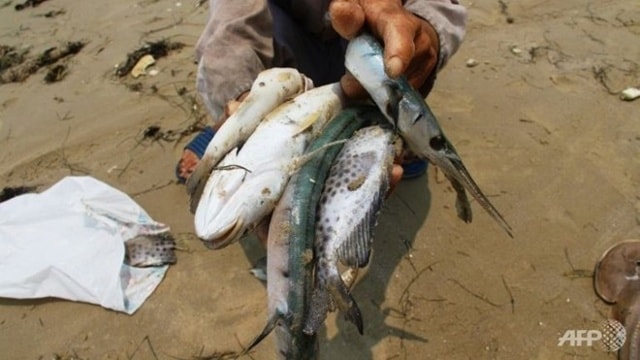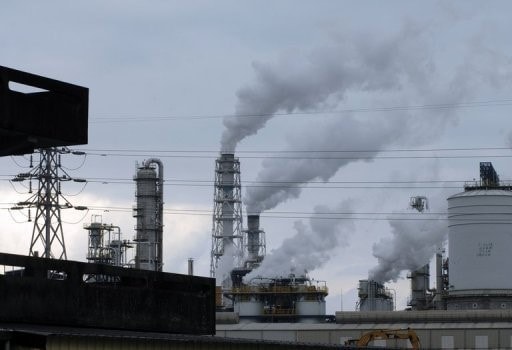Taiwan Environmental Association Demands Formosa Take Social Responsibility
The Taiwan Environmental Lawyers Association (EJA) and several other Taiwanese organizations have jointly demanded that Formosa take social responsibility for the fish deaths in Vietnam.
Mr. Chang Yu-yin, head of the Taiwan Environmental Lawyers Association, said that Formosa originally intended to build a steel mill in the Yunlin Industrial Park (Taiwan) and applied for a license in 2006 but the Taiwan Environmental Assessment Committee did not approve it.
The reason is that this factory does not meet environmental safety standards such as large amount of water used, large amount of CO2 emitted, air pollution, ecological destruction and impact on the seafood farming industry in the surrounding area.
 |
| A Vietnamese fisherman holds dead fish in central Vietnam. Photo: AFP |
On the association's official website, Mr. Chang called on the Taiwanese people not to ignore the fact that Formosa, because it failed to meet Taiwan's high environmental safety requirements, moved its highly polluting manufacturing industry to another country.
The head of the Environmental Lawyers Association also expressed that the people of this island and the people of Vietnam should stand together, together demanding that Formosa and China Steel take corporate social responsibility, proactively clarifying whether the cause of pollution is related to their steel plant in Vung Ang, Vietnam or not.
Request Formosa not to destroy Vietnam's marine ecosystem
The Environmental Lawyers Association, together with the Taiwan Human Rights Promotion Association, the Human Rights Convention Monitoring Alliance, the Vietnamese Catholic Community in Taoyuan (Taiwan), the Vietnamese Labor and Spouse Office, and several lawmakers have proposed the following demands to the “Black Planet” corporation.
1) Ensure that the Ha Tinh steel mill will not destroy Vietnam's marine ecosystem, so that Vietnamese people can continue to have clean seawater and live fish.
2) Must be socially responsible to the enterprise, publish information related to the fish death event and the death of the diver, such as:
* List of 384 tons of chemicals that Formosa Vung Ang steel plant imported into Vietnam since 2015, and their toxicity.
* Production process and wastewater treatment of Vung Ang steel factory.
* Monitoring data from the time of use to present of the steel mill's automatic wastewater monitoring system.
* The types and quantities of toxic substances present in the air and wastewater generated from the production process, together with their impact on the marine environment.
3) Quickly organize an investigation team, which should include scholars and non-governmental groups (NGOs), to impartially investigate the fish deaths and publish the relevant investigation results.
4) The Investment Affairs Bureau and the Taiwan Investment Review Committee should base on the outstanding issues of the fish deaths in Vietnam related to the Formosa Ha Tinh Steel Plant to guide Taiwanese enterprises investing abroad to fulfill their corporate responsibilities and be good “neighbors”. They should not violate international conventions on environmental protection, labor and human rights, and at the same time study specific solutions and revise relevant regulations on foreign investment review.
 |
| Smoke rises from a Formosa factory, one of the 10 most polluting companies on the island of Taiwan. Photo: Getty |
Formosa's "black record" may hinder the Southward expansion policy
Wu Kun-yu, a lawmaker from the ruling Democratic Progressive Party and a public health and food safety scholar, shares the same view as the environmental activists. Huang Yi-bi, from the Coalition to Monitor the Implementation of the Human Rights Convention in Tsai Ing-wen’s New Policy, also shares a similar view.
"Taiwan's leadership must ensure that its businesses comply with international human rights standards and cannot shirk its responsibility for corporate oversight and management, especially when China Steel, the largest shareholder of Taiwan's Ministry of Economic Affairs, is involved in the incident," Mr. Huang said.
Formosa was awarded the “Black Planet” award by Ethecon (Germany’s Ethical Economic Organization) in 2009 for causing pollution in many countries around the world. Recently, Ethecon also sent a public letter to Formosa about the corporation “ordering 300 tons of toxic chemicals to clean wastewater pipes, but refused to disclose what chemicals were used to clean, and what substances would be discharged…”.
Ethecon accused Formosa of “disregarding and violating regulations, legal order, ecological environment and peace, social rights and human rights.”
This large corporation “is not trusted by society because it does not care about corporate social responsibility, ignores the concerns of local residents about industrial pollution, and thereby creates an image of a polluting enterprise,” Eja.org.tw quoted lawmaker Su Chih-fen of the ruling Democratic Progressive Party, who has worked with Formosa many times.
Mr. Su emphasized that if Vietnamese society's concerns about pollution toward Taiwanese businesses are not carefully addressed, it will cause many obstacles for the new leadership's new "Southward expansion" policy.
According to Zing
